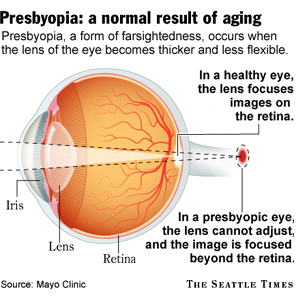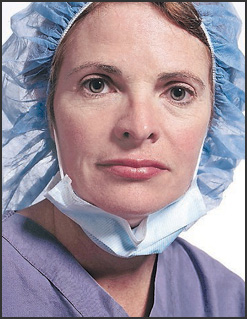 |
The beginnings of crow's feet, laugh lines and potbellies send many running to the plastic surgeon. Others diet, give up smoking and get divorced. On the plus side, earning power peaks.
|
 |
|
|
|
 |
 |
 |
 |
Appearance: Skin cells divide more slowly, causing the skin to thin. Wrinkles form around the eyes and mouth. More than 3 million people ages 35 to 50 had a cosmetic procedure last year in the U.S. Most popular: botox injections and liposuction.
Cancer risk: Starting at age 45, cancer becomes the top cause of death, surpassing accidents.
Fertility and virility: In Washington, 2,140 women over 40 had a baby in 2001. More than three times as many men of the same age group fathered a child. But men's testosterone levels begin to decline in their 40s. Some men report a gradual lessening of libido and sapping of energy.
Sight and sounds: Sounds gradually grow more muffled and high frequencies may drop off as the eardrum begins to lose elasticity. Around the early to mid-40s, you may find yourself holding reading materials at arm's length and suffering from sore eyes and headaches when doing paperwork. That's because the lens of the eye is gradually growing stiffer, a condition known as presbyopia, a type of farsightedness. Reading glasses, bifocals or contact lenses may help.

|
 |
|
 |
 |
 |
Divorces begin to outnumber marriages for those in their 40s in Washington.
Earning power peaks for those in the second half of their 40s.
Smokers who kick the habit before age 50 cut in half their risk of dying in the next 16 years.
|
 |
|
 |
 |
 |
Baby boomers: Someone born smack in the middle of the baby boom turns 48 this year. The 65-and-up set fondly remembers 46 as the age of their peak physical attractiveness.
Grandparents: While some couples in their 40s are having babies, others are becoming grandparents. An AARP survey found the average age to become a grandparent for the first time was 48.
|
 |
|
 |
 |
 |
For virtually all women - and many men - the 40s begin a decline in the hormones that have orchestrated so many aspects of sexual behavior and identity since puberty.
As estrogen levels drop, 90 percent of women will experience four to eight years of irregular menstrual periods before menopause, which occurs, on average, at age 51. Two-thirds of women will have hot flashes during this time.
By 40, female fertility drops off dramatically, as evidenced by the booming popularity of fertility treatments for older couples who still hope to have children. Natural pregnancy remains possible, but the chances of miscarriage, genetic abnormalities and birth complications climb.
Men's testosterone levels also start to slip in the 40s. The hormone decline is more gradual than in women and production rarely sputters out completely.
But interest in the so-called "male menopause" is intense, with sales of testosterone gels, patches and pills rising - despite a paucity of evidence that the drugs are safe or effective.
At a time when careers are peaking and the demands of child care are often compounded by concern for aging parents, both men and women may complain of a flagging sex drive.
The good news: Studies are validating the "use it or lose it" philosophy. Regular sex helps keep the system purring.
- Sandi Doughton, Seattle Times staff
|
 |
|
|
 |
 |
'I feel like I'm hitting my stride in my
40s - as a surgeon, a mother and a
human being.' |
 |
 |
 |
Photographed on Sept. 10, 2003,
Seattle Times staff |
Dr. Lisa Lynn Sowder, 47
|
Residence: Seattle
Occupation: plastic surgeon
Personal: husband, Nick O'Connell, twin 6-year-old sons and a 3-year-old daughter
As a plastic surgeon, Sowder spends much of her time helping patients turn back the clock. And she admits to having had a little work done herself. She also keeps young running around Green Lake and after her three small children.
Going under the knife: Most patients, Sowder says, "just want to look good for their age" - not younger than they are. Sowder has undergone surgery to lift sagging eyelids and liposuction to slim her thighs, and she gets Botox injections to smooth her forehead. "The role of surgery in aging is minor - it's about fixing the little things that bother you in the mirror so you can enjoy life with more self-confidence."
Motherhood delayed: Sowder married at age 38 and soon learned pregnancy wasn't a given. After several rounds of in vitro fertilization, she gave birth to twin boys at age 40. Nearly four years later, after a surprise pregnancy, her daughter was born. "My kids keep me young and make me old at the same time. Kids open you up to having fun again - I wouldn't own a baseball mitt if it weren't for my two boys."
Letting go: "I got my first pair of bifocals last week and I don't look great in a bikini anymore. But I no longer compare myself to myself at 20. I've replaced what I've lost with things like confidence, patience, deep friendships and long histories with people."
Priority No. 1: When Sowder turned 40, she challenged herself to run the 2.8 miles around Green Lake on her birthday every year - in fewer minutes than her age divided by two. Last birthday, she beat her test by 30 seconds. Sowder, who will be 62 when her daughter graduates from high school, says she considers staying in shape an obligation to her kids. "My best memories of my parents are being physically active with them - my father teaching me how to water-ski and my parents playing doubles tennis."
Prime time: "So much of surgery is judgment and experience, so in my field a few gray hairs are a huge advantage." She's also grown in other aspects of life: "Having my father die and having children has softened my heart. I don't have the hard edge I used to. I'm less critical, I'm more patient, I'm a better person than I was 10 years ago. I don't know if I'm at my prime, but I'm getting there."
- Julia Sommerfeld, Seattle Times staff
|
 |
 |
 |
 |
 |
 |
Control your cholesterol: High cholesterol increases risk of heart disease and stroke, especially among men over 45 and women over 55. The best prevention is exercising regularly, eating a healthful diet and not smoking. Men above 40 and women above 50 are urged to get a cholesterol test at least every five years.
Get a mammogram: Women should get a mammogram every one to two years after 40, according to government recommendations. Those thought to be at high risk for breast cancer might consider getting screened earlier.
|
 |
|
|
 |